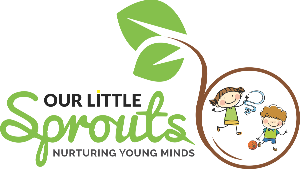Our Little Sprouts Curriculum follows an integrated, EYFS and NCFFS framework-aligned approach to learning for children ages 18 months to 3.5 years. This program fosters a safe, nurturing, joyful, and academically enriching environment.
First and foremost our program aims to nurture skills that are essential to life. These are characteristics that children are born with. They are naturally curious and filled with wonder and awe. They are explorers by nature and are always willing to have a go, critically and creatively solving all problems they encounter on their way. Their imagination is boundless, often turning a stick into a car or themselves becoming a doctor. They are not afraid to make mistakes, in fact, they learn through their mistakes. Children fall down a thousand times before they learn to walk, but they never give up. They try again with the same enthusiasm. It is these innate qualities that our program seeks to nurture alongside focussing on developing their literacy & communication skills, numeracy and scientific outlook, social-emotional skills, and creative thinking skills.
The program has at its core an Emergent Curriculum that is connected with the children’s everyday life experiences. This is a child-driven curriculum that is based on the interests and needs of the children. Children are taught what they want to learn, thereby, honouring and nurturing their innate curiosity. Teachers observe, record, and analyse children’s interests and develop the topics of study from those observations.
OUR CURRICULUM
Our Curriculum
LEARNING BY DOING & PLAY

We are inspired by the constructivist approach to learning, a belief that all children are able to construct their own knowledge through active engagement with the environment. Making mistakes, taking risks, and coming up with innovative solutions are an integral part of this process. When we are engaged in active exploration, our focus and concentration is boundless and learning is deep.
Even more important is the fact, that we do not just learn the lessons, we also sharpen skills that are essential for making us life-long learners, namely: curiosity, grit, resilience, focus, reflection and a never give-up attitude.
RICH LITERACY AND INTEGRATION

Language and Mathematics, both integral parts of our elementary program, are interwoven throughout our curriculum. At Our Little Sprouts, based on modern research findings, we have moved away from worksheets and rote memorisation for developing these skills. Instead literacy and math is integrated in all aspects of a child’s time in the school, all throughout the day.
To enable language acquisition our classrooms are language rich, with teachers having excellent written and oral communication skills. With a deep understanding of emergent literacy, developing phonemic awareness and the role of invented spellings, facilitators ensure that children learn how to understand, speak, read and write at their own pace. This ensure they fall in love with reading, writing and books. Reading-aloud stories and picture books is at the heart of our language program because we know:
Children are made readers on the laps of their parents and teachers.
Our mathematics program starts with observing and enabling the development of pre-math skills that happen naturally within children during play. They begin sorting, ordering, stacking and classifying objects, slowly making connections and developing a sense of numbers. Our program ensures that children do not just know their numbers, they become best friends with them
PEDAGOGY OF LISTENING

We strongly believe that listening to children's voices, both silent and spoken, are as important, or, perhaps, are the most crucial tools to enable teaching and learning. The pedagogy of listening means helping children search for meaning and understanding in what they do, what they encounter, and what they experience. Listening intently to children’s theories enhances the possibility of discovering how children think and how they both question and develop a relationship with reality. It therefore, helps us become friends with them, be better teachers and helps us plan brilliant learning experiences for them. But even more important than all of this is that:
When a child feels seen and heard in a classroom they feel valued, respected, safe and above all beloved.
We believe every child deserves to feel beloved and therefore, it is our highest calling to listen to our children with intent and love.
PEDAGOGY OF FRIENDSHIPS

Knowing that we can be loved exactly as we are gives us all the best opportunity for growing into the healthiest of people. - Fred Rogers
Relationships are the heart of pedagogy. Once strong reciprocal and responsive relationships are in place, curriculum becomes authentic and meaningful. The bond between teachers and children enable teachers to really see children’s interests and strengths and allow children to trust the teachers in their journey of learning.
Listening to children allows us to form a genuine friendship with them. Friendship with children allows us to become effective teachers. We feel blessed to have a passion that allows us to have such pure friendships.
MAKING LEARNING VISIBLE

Our Little Sprouts follows the method of assessment via documentation. Teachers put together learning stories, which are rich records of children and their understandings. We document learning through anecdotal notes, photos and videos, recording them when engaged in real instances of learning or in rich conversation. Their original art and craft works are all preserved and handed over to parents at the end of each learning cycle in a portfolio of records.
These records give us a snapshot of children’s development through time. They help is seeing where children are in their learning journey, telling us how they learn and informing us about their needs. These documents help us in making learning visible.
